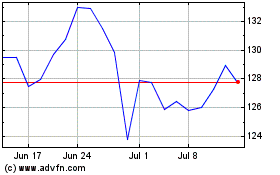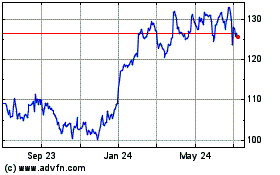Bristol Myers: Opdivo Failed to Meet Endpoint in Key Lung Cancer Study--4th Update
August 05 2016 - 12:58PM
Dow Jones News
By Peter Loftus, Jonathan D. Rockoff and Anne Steele
In a surprise finding that raises questions about the potential
for a new class of cancer drugs that harness the body's immune
system, Bristol-Myers Squibb Co. said its drug Opdivo wasn't
significantly better than chemotherapy in a study of patients with
newly diagnosed lung cancer.
The outcome is a big blow to Bristol-Myers, which had been
counting on a positive study to help widen its lead in the
lucrative new market for cancer immunotherapies. Bristol-Myers
shares recently declined 16% to $63.41, wiping out about $20
billion of its market capitalization.
It also suggests there could be limitations for an expensive
class of drugs that has been seen as capable of improving treatment
of a wide range of tumors. For the most part, these drugs have
shown impressive results in prior clinical studies in certain tumor
types. For instance, studies have shown they have significantly
prolonged the lives of many patients with melanoma, a deadly form
of skin cancer, compared with older treatments.
Opdivo, which costs about $12,900 a month per patient, was
initially approved to treat melanoma in 2014. U.S. regulators have
steadily expanded its uses to include patients whose lung cancer
worsened after trying chemotherapy, as well as patients with kidney
cancer and a type of lymphoma. Most analysts expected Opdivo to
show a benefit in patients with newly diagnosed lung cancer -- a
larger patient population than Opdivo's other uses.
The Bristol-Myers setback could provide an opening for rival
Merck & Co. Its shares jumped more than 6% Friday because, in
contrast to Opdivo, Merck's competing immunotherapy Keytruda
prolonged survival in a separate study of patients with newly
diagnosed lung cancer, versus chemotherapy. Merck hasn't yet
released full results of that study.
Keytruda also is currently approved to treat lung-cancer
patients who have already tried chemotherapy, as well as skin
cancer. Roche Holding AG and AstraZeneca PLC also are studying
cancer immunotherapies to treat lung cancer.
"The companies have been locked in a marketing battle in lung
cancer," which could be worth $10 billion to $15 billion in annual
sales, Bernstein analyst Tim Anderson wrote in a note Friday. To
date, Bristol-Myers has dominated the market "by a wide margin.
Today's news very much helps level the playing field and is a major
boost for" Merck, he said.
Bristol-Myers said it is disappointed with the results, but that
the trial was just one in a constellation exploring the best way to
use immunotherapies. The company sees potential in using Opdivo in
combination with its older immunotherapy, Yervoy, for newly
diagnosed lung cancer patients, a use known as first-line
treatment. A study of such a combination is ongoing.
"Although this is disappointing in the short term, in the long
term it doesn't really change what we think about the role of
immunotherapy and the combination of Opdivo and Yervoy,"
Bristol-Myers Chief Executive Giovanni Caforio said in an
interview.
Bristol's study, dubbed "Checkmate -026," enrolled about 535
patients with advanced non-small cell lung cancer, the most common
form of lung cancer, who hadn't received prior treatment with any
drug. Some patients received Opdivo while others received
chemotherapy. The main goal was to demonstrate that Opdivo delayed
disease progression or death compared with chemotherapy. Opdivo
missed the goal, Bristol-Myers said Friday in a news release. The
company hasn't yet published full results from the trial.
Non-small cell lung cancer accounts for about 85% to 90% of all
lung-cancer cases. The National Cancer Institute estimates 224,390
Americans will be diagnosed with lung cancer this year, and 158,080
will die from it.
Sales of Opdivo soared to $840 million in the most recent
quarter, up $718 million from a year earlier and accounting for
much of Bristol's revenue gains in the quarter.
Sales of Keytruda nearly tripled in Merck's latest quarter to
$314 million. The company is awaiting a U.S. Food and Drug
Administration decision on whether to expand Keytruda's use to
include treating head and neck cancer; the FDA's target action date
is Aug. 9.
A Merck spokeswoman said the company couldn't comment on the
Bristol study because full results haven't been released. She said
Merck expects to release results of its first-line lung-cancer
study of Keytruda in the near future.
Write to Peter Loftus at peter.loftus@wsj.com, Jonathan D.
Rockoff at Jonathan.Rockoff@wsj.com and Anne Steele at
Anne.Steele@wsj.com
(END) Dow Jones Newswires
August 05, 2016 12:43 ET (16:43 GMT)
Copyright (c) 2016 Dow Jones & Company, Inc.
Merck (NYSE:MRK)
Historical Stock Chart
From Mar 2024 to Apr 2024

Merck (NYSE:MRK)
Historical Stock Chart
From Apr 2023 to Apr 2024
